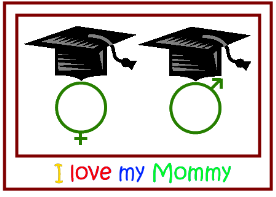Herr Professor Daddy? I didn’t think so.
 Anyone who thinks male and female professors are treated equally by students is clueless. Just recently I came across a couple of examples that are very illustrative of this point. A friend of mine told me that her undergraduate advisees gave her a photo of themselves in a picture frame that says: “I love my Mommy”. (Apologies for the pathetic illustration accompanying this post, but given the time I put into it, I’m posting it.) Then just a few days later, I came across the following note on Twitter:
Anyone who thinks male and female professors are treated equally by students is clueless. Just recently I came across a couple of examples that are very illustrative of this point. A friend of mine told me that her undergraduate advisees gave her a photo of themselves in a picture frame that says: “I love my Mommy”. (Apologies for the pathetic illustration accompanying this post, but given the time I put into it, I’m posting it.) Then just a few days later, I came across the following note on Twitter:
A friend of mine just bought this (as a gag) for her diss. director http://bit.ly/11LSdW.
Yes, click on the link. I’ll tell you where it leads, but you’ll appreciate it better if you see the image. The link is to a children’s book called “My Beautiful Mommy”. Raise your hand if you’re a male professor and students have given you similar gifts “as a gag”. No one? Shocking.
I can see the comments already: “If female profs are more caring then what’s wrong with students expressing their appreciation for that?”
First of all, students demand much more emotional work from female professors than they do of male profs. If the women don’t provide it, they are often viewed as cold bitchy profs that don’t care about students. Although I don’t know of any systematic studies of what types of topics students bring up during interactions with professors by gender, I have heard plenty of anecdotal evidence suggesting that female profs get approached much more by students wanting to talk about life issues than male profs. (More generally speaking, there is literature on how gender influences teaching evaluations, here are some older references.)
Second, there are plenty of ways to express appreciation that don’t involve putting the female prof in a mothering role, a role that certainly isn’t emphasizing her academic strengths and credentials. As my friend noted, a gift of this sort makes her feel as though her only contribution to the students’ success was in shepherding them through their projects and not in providing intellectual stimulation, helping them professionally, or contributing to the creation of new well-trained researchers. Maybe, just maybe, she’d like to be recognized for her intellectual contributions and the part of mentoring that involves the research aspects of her job. And while it would be neat if mothering was equated with all of those things, don’t kid yourself. Of course there is nothing wrong with being compassionate and caring, but it’s not what tends to be rewarded professionally in academia.

August 19th, 2008 at 11:50 am
I saw another manifestation of this sort of thing during my Master’s courses. Male professors, with the exception of one, were always addressed by students as “Professor Smith”, and female professors were always addressed by just their first names, and this held true for both male and female students. With the exception of one male prof, who asked each class to just address him by his first name, none of the other professors invited students to call them one form or the other – it was just the accepted cultural norm that students would address one gender one way, and one the other, which sets up a strange hierarchical element that elevates men up to a more respected position and brings women down to a more personal level, regardless of their place in the academic hierarchy.
August 19th, 2008 at 1:07 pm
Definitely, something needs to change there!
At the same time, people relate to men and women differently in every context, not just this one. Every profession, every organization–and surely in non-professional, social situations too.
Should we strive to eliminate all of these differences? Maybe just the professional ones? I’m all for professional and workplace equity, but I wonder if there’s a limit to how androgynous we can become in our interactions as human beings.